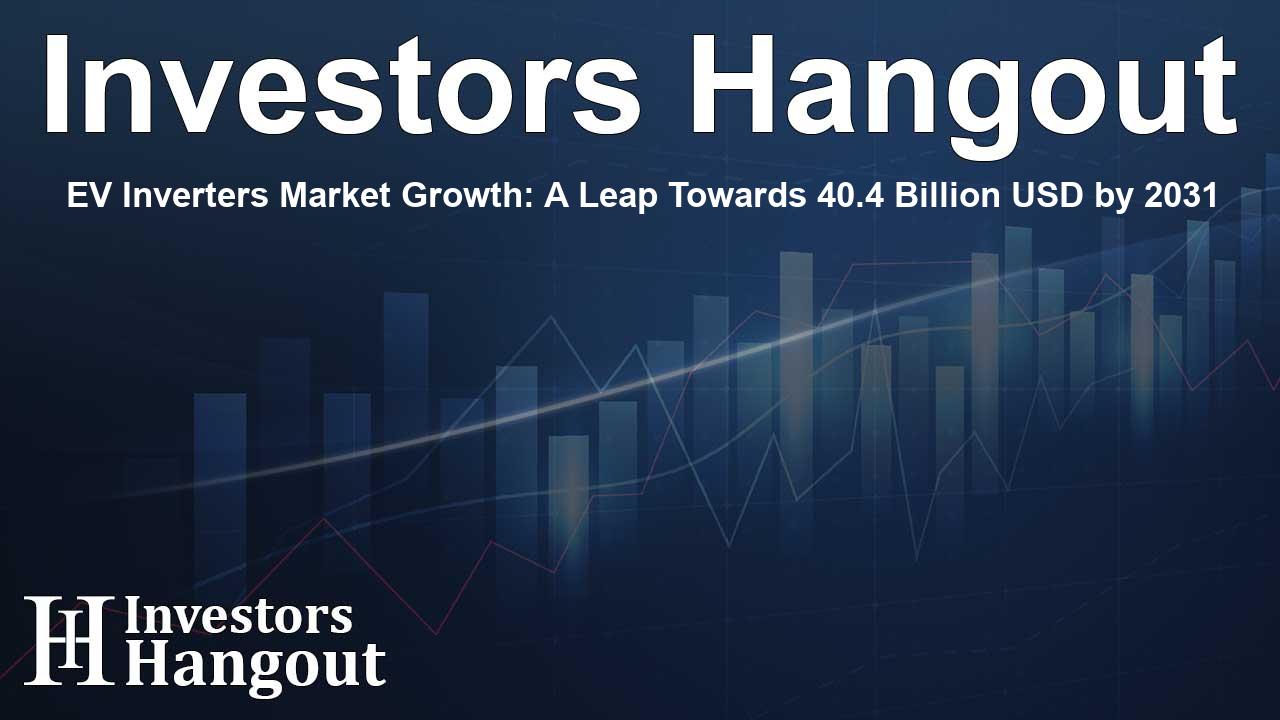EV Inverters Market Growth: A Leap Towards 40.4 Billion USD by 2031

Overview of the EV Inverters Market Growth
The EV inverters market is entering an exciting phase, with projections indicating a rise from a valuation of 17.0 billion USD in 2024 to an impressive 40.4 billion USD by 2031. This remarkable growth reflects a compound annual growth rate (CAGR) of 12.4% over the forecast period. The insights provided by market experts reveal the trends and developments that are driving this surge and how companies can prepare for the future.
Market Trends and Dynamics
This market analysis, conducted by relevant research experts, gives a clear picture of the global trends surrounding EV inverters. One of the main catalysts is the increasing demand for electric vehicles (EVs). As the world shifts towards sustainability, the need for efficient inverters that convert battery power into usable energy becomes ever more crucial.
Key Market Drivers
- The continuous rise in EV sales signals a corresponding demand for inverters capable of converting electric battery power effectively.
- Technological advancements in power electronics, especially with the adoption of silicon carbide (SiC) and gallium nitride (GaN), are increasing inverter efficiency.
- With stricter emission regulations and growing government incentives, manufacturers are pushed towards developing lighter, compact, and more efficient inverter technologies to meet consumer expectations.
Regional Insights
Asia-Pacific stands out as the dominant region for EV inverters, being spurred by significant EV production in countries like China. Government policies, advancements in technologies, and extensive charging infrastructure play pivotal roles in this surge. China's robust manufacturing capabilities and local demand present a favorable landscape for the widespread adoption of EV technologies.
Understanding Market Segmentation
The EV inverters market can be segmented based on various factors including vehicle type, EV type, technology type, and integration models. Let's explore these segments in greater detail.
Vehicle Type Segmentation
The market categorizes vehicles into light vehicles (LV) and medium & heavy-duty commercial vehicles (M&HC). Light vehicles, which encompass passenger cars and light commercial vehicles, are expected to dominate during this period. Various governmental incentives aimed at increasing the production of EVs and enhancing vehicle performance through advanced e-motor technologies further bolster the segment’s growth.
EV Type Segmentation
In the realm of EV types, hybrid electric vehicles (HEVs) presently hold a significant portion of the market, but battery electric vehicles (BEVs) are on the rise, projected to take the lead soon. HEVs provide a practical approach to consumers' range anxiety, while advancements in battery infrastructure continue to favor the growth of BEVs.
Competitive Landscape
The EV inverters market features a moderately fragmented landscape with numerous players. Key enterprises such as Denso Corporation, BYD Auto Co., Ltd., Tesla, Inc., and Valeo SA are significantly influencing market dynamics through competition in service offerings, pricing, and regional reach.
Future Outlook
As we move towards 2031, the EV inverters market is expected to continue flourishing, driven by technology innovations and a global emphasis on sustainable practices. Companies must remain agile to adapt to changing consumer preferences and regulatory shifts.
Frequently Asked Questions
1. What is the projected growth of the EV inverters market?
The market is projected to grow from 17.0 billion USD in 2024 to 40.4 billion USD by 2031.
2. Which regions are leading in the EV inverters market?
Asia-Pacific, particularly China, is leading the market, driven by high production rates and extensive charging infrastructure.
3. What are the main types of EVs impacting the inverter market?
Both hybrid electric vehicles (HEVs) and battery electric vehicles (BEVs) are significantly shaping the market's future, with BEVs expected to gain dominance.
4. Who are the key players in the EV inverters market?
Major players include Denso Corporation, BYD Auto Co., Ltd., and Tesla, Inc., among others.
5. How are technological advancements influencing the EV inverters market?
Innovative technologies in power electronics, like silicon carbide and gallium nitride, are enhancing efficiency and further driving market growth.
About The Author
Contact Henry Turner privately here. Or send an email with ATTN: Henry Turner as the subject to contact@investorshangout.com.
About Investors Hangout
Investors Hangout is a leading online stock forum for financial discussion and learning, offering a wide range of free tools and resources. It draws in traders of all levels, who exchange market knowledge, investigate trading tactics, and keep an eye on industry developments in real time. Featuring financial articles, stock message boards, quotes, charts, company profiles, and live news updates. Through cooperative learning and a wealth of informational resources, it helps users from novices creating their first portfolios to experts honing their techniques. Join Investors Hangout today: https://investorshangout.com/
The content of this article is based on factual, publicly available information and does not represent legal, financial, or investment advice. Investors Hangout does not offer financial advice, and the author is not a licensed financial advisor. Consult a qualified advisor before making any financial or investment decisions based on this article. This article should not be considered advice to purchase, sell, or hold any securities or other investments. If any of the material provided here is inaccurate, please contact us for corrections.
